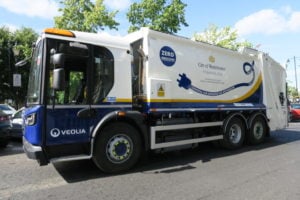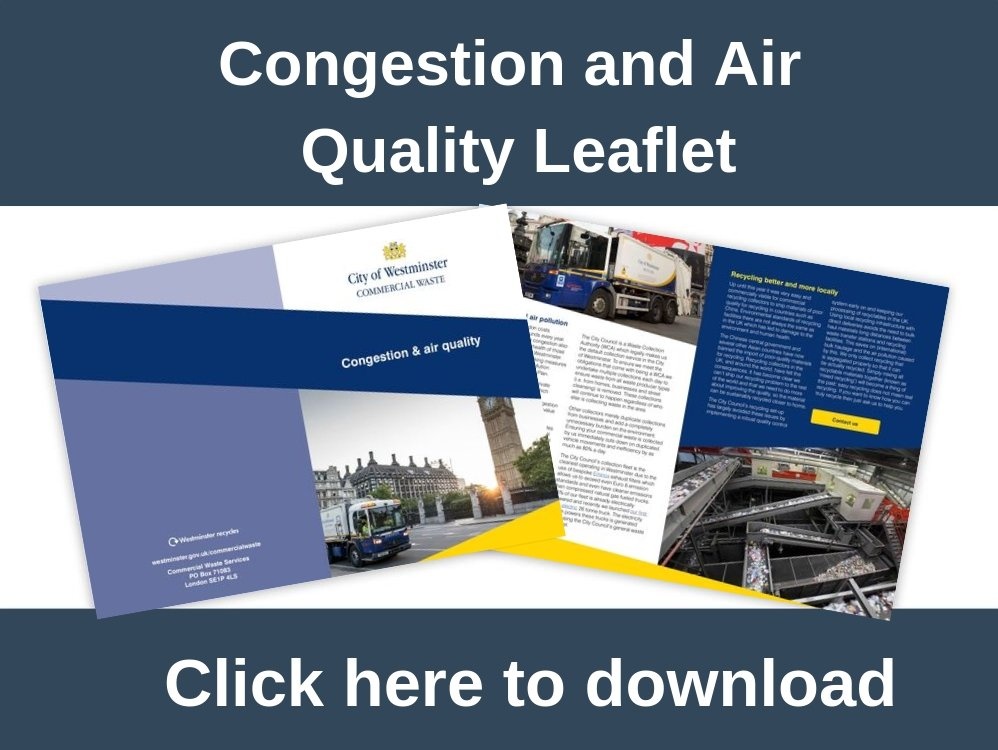With the City of Westminster having some of the worst air pollution levels in Europe, at Westminster City Council we know it is essential to create viable, reliable, robust and sustainable solutions to tackle this problem. This is especially important if we are to reach the goal of making Westminster a carbon-neutral city by 2040.
In partnership with Veolia, Magtec and Sheffield City Council, and with funding from Innovate UK, the electric refuse collection vehicle (eRCV) project upcycles diesel trucks reaching their end-of-life. Powered by the electricity produced from the waste they collect, these vehicles are all fitted with new electric engines to reduce harmful emissions.
Entering a new testing phase

We launched four 26-tonne eRCVs ready for testing in September 2019. While two are currently being assessed in the busy, urban area of Westminster, the remaining two are located in Sheffield, enduring steep hills and greater distances between collection points.
Since the launch of these four vehicles, there have been significant improvements, updates and additional assessment phases added to the eRCV project. We are continuously managing efficiencies and monitoring the vehicles’ daily journeys to keep an eye on their performance.
We are also putting the vehicles to the maximum test. This includes increasing weight loads, testing charging capacity, driving longer distances, examining durability during drastic temperature changes and conducting double shifts. The double shift on these vehicles consists of going out for collections from 06:00 to 14:00, returning to the depot to charge for two to three hours, then going back out for another eight-hour trip.
The battery charge on the vehicles showed great resilience when faced with the drops in temperature over the past winter, proving great vehicle reliability. Adding these extra layers of testing helps to prove the stability and credibility of the vehicles and shows that they can become a full replacement for their diesel counterparts.
The electricity needed to power our eRCVs is generated using the (unrecyclable) waste we collect as a fuel. The SELCHP facility, where this low carbon electricity is produced, allows us to power our trucks with the very waste collected from Westminster homes and businesses earlier in the day. Charging trucks can mean putting a big strain on the local electricity grid. By connecting directly into SELCHP with our own cable, we can avoid putting undue pressure on London’s heavily used power grid.
Growing the fleet
As the 26-tonne vehicles continue to undergo testing, we are currently in the process of acquiring two 18-tonne vehicles, which are slightly smaller and can easily operate through Westminster’s narrow streets. Additionally, two smaller, fully electric minivan vehicles will be used for street cleansing operations. These new vehicles will also be subject to the same level of testing as the 26-tonne eRCVs (double shifts, increasing weight loads, severe weather, charging capacity etc).
The goal is to transform the West End and neighbouring districts to use only fully electric vehicles for waste and recycling collections and street cleansing operations before 2030.
What comes next?
The reports of our eRCV testing are currently suggesting great performance and reliability, with fleet operators giving their seal of approval. Since winning the ‘Most Sustainable Fleet Management Department’ at the 2020 LAPV Future Fleet Awards, Westminster City Council has received enthusiastic requests for data and feedback on the eRCV project from local and international authorities.
Apart from continually testing and updating the software of the vehicles, we are set to implement a two-speed gearbox to enhance power. Currently, the existing trucks operate on a drive-reverse-stop model. The two-speed gearbox will enable the 26-tonne vehicles (with full collection loads) to go up and down steeper ramps at a 20 to 25-degree gradient, without any issues. This is especially helpful in mountainous areas such as Sheffield, the Lake District and parts of Scotland.
By continuing to improve and advance the eRCV project, Westminster City Council is at the forefront of innovation and sustainable solutions to help the environment. Westminster City Council’s ultimate goal will be to make the entire 200-vehicle fleet fully electric by 2022.
Read our ‘News’ section for more updates on the evolution of Westminster City Council’s eRCVs.
How can your business contribute to better air quality?
Many Westminster businesses have discovered the superior environmental benefits of using the City Council’s business waste collection services.
Collections by private commercial waste providers (using old-fashioned combustion engine vehicles) place an unnecessary burden on the environment since they duplicate journeys that already exist as part of the City Council’s collection system. This further increases traffic congestion and pollution levels, affects Londoners’ health and fails to add any genuine value for the local community. Increased vehicle movements also have a negative impact on traffic safety.
These private collectors may also use small and inefficient diesel-powered vehicles, resulting in an excessive number of round trips to collect waste. These outdated diesel-fuelled vehicles also produce high exhaust emission levels which contribute towards air pollution and Westminster residents’ health issues.
By having Westminster City Council collect your business’ commercial waste, you can reduce these duplicated journeys by up to 80%. If you wish to know more about traffic congestion and air quality in Westminster, be sure to download our congestion and air quality leaflet.





